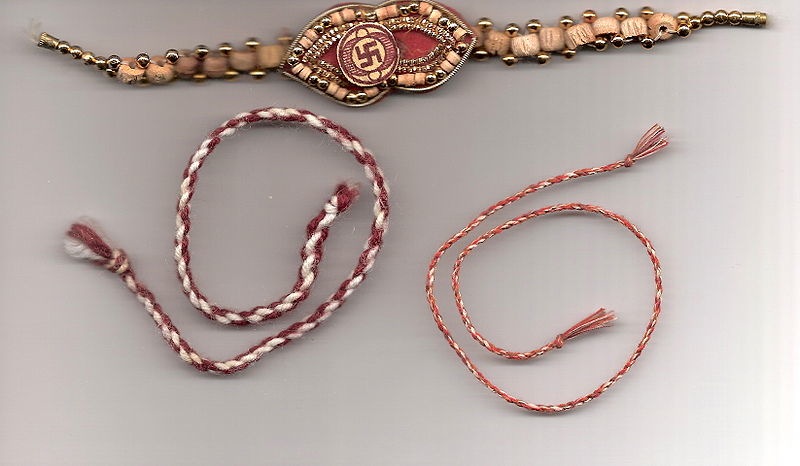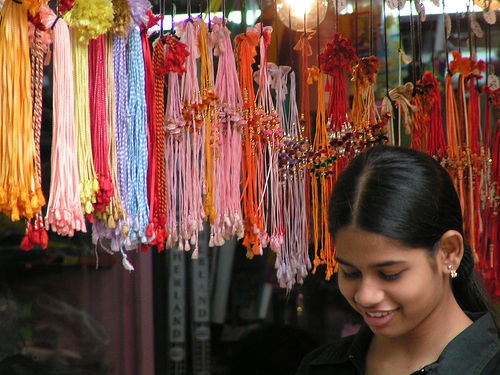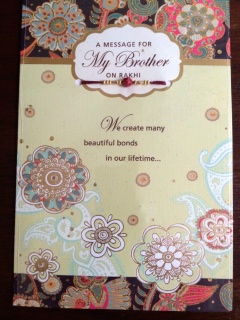Raksha Bandhan (the bond – Bandhan of protection – Raksha) is a Hindu festival, which celebrates the love between brothers and sisters. It is celebrated on the full moon (poornima) of the month of Shraavan (August 18th, 2016). This article discusses the different ways that Raksha Bandhan is celebrated across India, the legends behind the festival and the spiritual significance of the festival.
Traditional Celebrations of Raksha Bandhan
Perhaps the single most important way of celebrating Raksha Bandhan is by tying the raakhi (राखी). A sister ties a raakhi to the wrist of her brother. The tying of a raakhi signifies the sister asking of her brother for his protection and love. The brother in turn, accepts the raakhi, confirms his love and affection, and presents the sister with gifts and sweets. It is a family event where all members of family, dressed in finery, gather and celebrate.
The sister ties a colored thread (raakhi) on the brother’s wrist to remind him that he is to protect her during times of adversity, and it is believed that the sister protects her brother by virtue of the fact that she prays that her brother is always saved from harm’s way, and in every way. Hence, the protection is two-fold – from the sister to the brother, and vice-versa.
More than brothers and sisters…
Though in principle raksha bandhan is an observance between biological siblings of the opposite sex, the practice often extends more generally to people of the opposite sex who are not biologically related, or who are not related as siblings.
Everywhere, especially in north and western India, females might tie a raakhi around the wrist of boys and men without sisters. A man might acquire a muh boli behen, that is a sister who in every respect is such except in biological fact; or a woman may tie a raakhi around the wrist of her male first cousin who is without sisters. Similarly soldiers can expect to have women tie raakhisaround their wrists.
Even though Raksha Bandhan is a festival of brothers and sisters, a wife could tie it on her husband so that he may protect her or so that he may be protected. In fact, the wives of Rajput warriors would often tie a protective thread around the hands of their husbands while sending them off to do battle.
Related Celebrations Across India
In Northern India, raakhi Purnima is also called Kajri Purnima or Kajri Navami, when wheat or barley is sown, and goddess Durga is worshipped. In Western states, the festival is called Nariyal Purnima or the Coconut Full Moon. In Southern India, Shravan Purnima is an important religious occasion, especially for the Brahmins. It is an occasion for those wearing the janeou or sacred thread to “renew their brahmanical vows” on this day.
Raksha Bandhan is known by various names: Vish Tarak – the destroyer of venom, Punya Pradayak – the bestower of boons, and Pap Nashak – the destroyer of sins. Raksha Bandhan is called Avani Avittamin South India. Hindus wear a new holy thread and offer libations of water to the ancient Rishis on this day.
History and Legends of Raksha Bandhan
According to legend, Raksha Bandhan was a ritual followed by Lord Yama (the Lord of Death) and his sister Yamuna. Yamuna tied raakhi to Yama and bestowed him with immortality. Yama was so moved by this gesture that he declared that whoever gets a raakhi tied from his sister and promised her protection will become immortal.
In the epic Mahabharata, Lord Krishna advised Yudhishtra, the eldest of the Pandavas to observe the Raksha Bandhan ritual to ward off untoward incidents and impending evils. During the battle of Mahabharata, Queen Kunti tied a raksha on her grandson Abhimanyu to protect him in battle.
The Bhavishya Purana cites a story that the devas once battled with the danavas (demons) for twelve years. However, the devas lost, including the mighty Indra. So they prepared to fight again. On this occasion, Indrani tied a rakshaa on her consort Indra, after extolling Raksha Bandhan’s glory. Indra then attained victory.
Another legend suggests that the festival of Raksha Bandhan commenced when Goddess Lakshmi tied the ‘rakhadi‘ (रखडी) (‘raakhi’ in Hindi) on King Bali. Since King Bali offered devotion by sacrificing everything to Lord Vishnu, the day is also known as ‘Bali-eva’ or ‘Baleva’ for short. Therefore when Brahmin priests perform puja rituals, they chant a famous mantra while tying the ‘nada chhadi’ (raksha or नाद छडी) on a devotee:
Yena baddho Baliraja daanavendro Mahaabala, tena twaamabhi badh naami rakshe naa chala naa chala
येना बद्धो बालीराजा दानवेन्द्रो महाबला, तेना त्वामभी बधनामी रक्षे ना चला ना चला ।
i.e. I tie on you (the devotee) the rakshawhich was tied on Bali, the King of demons. Therefore O Raksha! Do not ever fail to protect this devotee, do not ever fail.
Social and Spiritual Significance
‘Raksha Bandhan’ or raakhi is a special occasion to celebrate the emotional bond between siblings by tying a holy thread around the wrist. It means ‘a bond of protection’, and Raksha Bandhan signifies that the strong must protect the weak from all that’s evil. The festival also affords a most auspicious occasion to recharge ourselves every year with the true spirit of service and sacrifice for the welfare of the society, and find therein the highest spiritual fulfillment of human life.
The sister-brother relationship highlighted by Raakhi goes far beyond the mere personal protection of a female from a male. It also implies the basic element of an amicable and harmonious social life where all members of the society look upon themselves as brothers and sisters and as children of one common motherland.
One may invoke the following shaanti mantra on this occasion:
sarve bhavantu sukhinah, sarve santu niraamayaah, sarve bhadraani pashyantu, maa kashchidh dukh bhaag-bhavet.
सर्वे भवन्तु सुखिन: सर्वे सन्तु निरामया:, सर्वे भद्राणि पष्यन्तु माँ कष्चिद् दु:ख भाग्भवेत: ।
Audio and Details of the Shaanti Mantra
Personal Note
Raakhi remains one of my favorite festivals. Even though I have not been physically present in India among my many sisters for this occasion in many years, I always look forward to receiving their raakhis in the mail from overseas. The phone conversations with my sisters on this day are full of special thoughts and wishes – my thoughts always go back to that eternal song by Lata Mangeshkar – “bhaiya mere raakhi ke bandhan ko nibhaana, bhaiya apni chotti behen ko naa bhulaana” (भय्या मेरे राखी के बन्धन को निभाना, भय्या अपनी छोटी बहिन को ना भुलाना) – dear brother, do not forget to honor the bond of rakhi between you and me, dear brother, no not forget your dear little sister. Hope you have a great Raakhi with your siblings and your families!
How do you celebrate Raksha Bandhan – please share with us in the comments below. Maybe you can send a special invite to your sister or brother to read this article (use the ‘send to friend’ link above) and wish them a “Happy Raakhi”! If you would like to receive more articles from our site, please subscribe to our email updates – Namaste!



